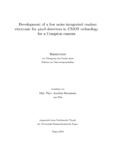Citation link:
https://nbn-resolving.org/urn:nbn:de:hbz:467-1336Files in This Item:
| File | Description | Size | Format | |
|---|---|---|---|---|
| hausmann.pdf | 58.06 MB | Adobe PDF |  View/Open | |
| abst_ger.pdf | 74.35 kB | Adobe PDF |  View/Open |
| Dokument Type: | Doctoral Thesis | metadata.dc.title: | Development of a low noise integrated readout electronic for pixel detectors in CMOS technology for a Compton camera | Authors: | Hausmann, Joachim | Institute: | Fachbereich 7, Physik | Free keywords: | Halbleiterdetektor ,, Compton-scattering, high energy physics | Dewey Decimal Classification: | 530 Physik | GHBS-Clases: | UIGD | Issue Date: | 2002 | Publish Date: | 2006 | Abstract: | Semiconductor detectors are very popular, particularly for their good energy resolution and their easy handling. Combined with a two dimensional spatial resolution such a detector is predestined to realise an active collimation in a Compton camera for medical applications. To measure the deposited energy in each channel (pixel), a self-triggering integrated electronic has been developed, which is directly bonded on top of the detector. The design of the low noise readout electronic ('Ramses') for a 32 x 32 matrix of 150 µm x 150 µm pixels, the layout and measurements are presented. Closest attention is paid to silicon detectors, which are favoured for Compton scattering with regard to Doppler effect. Nevertheless the electronic chip is also designed to measure the energy deposited by photo absorption in a detector material with higher atomic numbers (GaAs, CdTe). Halbleiterdetektoren sind weit verbreitet, insbesondere auf Grund ihrer hervorragenden Energieauflosung und einfachen Handhabbarkeit. Gepaart mit einer zweidimensionalen Ortsauflosung sind sie insbesondere prädestiniert, eine aktive Kollimation, wie beispielsweise innerhalb einer Compton-Kamera zur medizinischen Diagnostik, zu implementieren. Um die Energieinformation eines jeden Kanals (Pixels) zu gewinnen, ist eine selbsttriggernde, integrierte Elektronik entwickelt worden, die direkt auf den Detektor aufgebracht wird. Im folgenden werden sowohl die Konzepte der r auscharmen a nalogen Pixel m atrix- S ignalverarbeitungs e lektronik aus S iegen ('Ramses') für eine 32 x 32 Matrix, basierend auf 150 μm x 150 μm großen Pixeln, als auch deren layout-technische Umsetzung sowie Messungen präsentiert. Das Hauptaugenmerk richtet sich dabei auf Siliziumdetektoren, die hinsichtlich des Doppler-Effektes das Material der Wahl für den Comptoneffekt darstellen. Der gleiche Elektronikchip ist auch geeignet, die Energie bei Photoabsorption in Detektormaterialien mit hoherer Kernladungszahl (GaAs, CdTe) zu bestimmen. |
URN: | urn:nbn:de:hbz:467-1336 | URI: | https://dspace.ub.uni-siegen.de/handle/ubsi/133 | License: | https://dspace.ub.uni-siegen.de/static/license.txt |
| Appears in Collections: | Hochschulschriften |
This item is protected by original copyright |
Page view(s)
301
checked on Nov 28, 2024
Download(s)
142
checked on Nov 28, 2024
Google ScholarTM
Check
Items in DSpace are protected by copyright, with all rights reserved, unless otherwise indicated.

